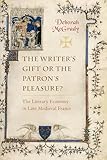The Writer's Gift or the Patron's Pleasure? : The Literary Economy in Late Medieval France / Deborah McGrady.
Material type: TextPublisher: Toronto : University of Toronto Press, [2018]Copyright date: ©2019Description: 1 online resource (366 p.)Content type:
TextPublisher: Toronto : University of Toronto Press, [2018]Copyright date: ©2019Description: 1 online resource (366 p.)Content type: - 9781487503659
- 9781487518448
- 944.025 23
- DC100 .M347 2019
- online - DeGruyter
| Item type | Current library | Call number | URL | Status | Notes | Barcode | |
|---|---|---|---|---|---|---|---|
 eBook
eBook
|
Biblioteca "Angelicum" Pont. Univ. S.Tommaso d'Aquino Nuvola online | online - DeGruyter (Browse shelf(Opens below)) | Online access | Not for loan (Accesso limitato) | Accesso per gli utenti autorizzati / Access for authorized users | (dgr)9781487518448 |
Frontmatter -- Contents -- List of Illustrations -- Acknowledgments -- Abbreviations -- Introduction: Rethinking Literary Patronage in a Medieval Context -- 1. King Charles V’s Sapientia Project: From the Construction of the Louvre Library to the Books He Commissioned -- 2. The Writer’s Work: Translating Charles V’s Literary Clientelism into Learned Terms -- 3. Guillaume de Machaut’s Fictions of Engagement -- 4. Eustache Deschamps on the Duties and Dues of Poetry -- 5. The Pursuit of Patronage: From Christine de Pizan’s Troubled Dealings with Louis of Orléans to Marketing Nostalgia -- 6. The Curse of the Commission: Christine de Pizan on Sacrificing Charles V’s Biography -- Conclusion -- Notes -- Bibliography -- Index
restricted access online access with authorization star
http://purl.org/coar/access_right/c_16ec
The Writer’s Gift or the Patron’s Pleasure? introduces a new approach to literary patronage through a reassessment of the medieval paragon of literary sponsorship, Charles V of France. Traditionally celebrated for his book commissions that promoted the vernacular, Charles V also deserves credit for having profoundly altered the literary economy when bypassing the traditional system of acquiring books through gifting to favor the commission. When upturning literary dynamics by soliciting works to satisfy his stated desires, the king triggered a multi-generational literary debate concerned with the effect a work’s status as a solicited or unsolicited text had in determining the value and purpose of the literary enterprise. Treating first the king's commissioned writers and then canonical French late medieval authors, Deborah L. McGrady argues that continued discussion of these competing literary economies engendered the concept of the “writer’s gift,” which vernacular writers used to claim a distinctive role in society based on their triple gift of knowledge, wisdom, and literary talent.
Mode of access: Internet via World Wide Web.
In English.
Description based on online resource; title from PDF title page (publisher's Web site, viewed 01. Dez 2023)


